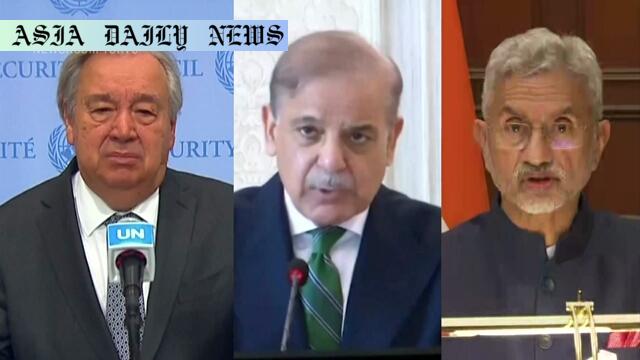Kashmir Tensions – The UN has urged India and Pakistan to de-escalate following continued conflict over a fatal tourist attack.
UN intervenes to urge de-escalation in rising Kashmir tensions.
Violence in Kashmir claims 26 lives, escalating India-Pakistan relations.
Diplomatic measures escalate as nations exchange fire and close airspaces.
UN Secretary-General calls for peaceful resolutions to avoid global implications.

Introduction to the Kashmir Tensions
The tensions between India and Pakistan have reached a critical point following the tragic April 22 attack in Indian-administered Jammu and Kashmir. The deadly incident, which claimed 26 lives, has not only triggered regional hostility but attracted global condemnation and intervention. As the two nations exchange accusations and retaliatory actions, the world is left grappling with the possibility of full-scale conflict between nuclear-armed neighbors. The United Nations has issued appeals for de-escalation, emphasizing the disastrous repercussions global communities may face if the situation spirals further out of control. Secretary-General Antonio Guterres has conveyed the urgency of diplomacy through high-level talks, urging both nations to opt for resolution over retaliation.
What Led to the Current Escalation?
On April 22, a group of tourists visiting Jammu and Kashmir fell victim to a violent attack, resulting in 26 casualties. Indian authorities declared the incident an act of terrorism and cited suspicions of links with Pakistan-based groups. Islamabad, however, has refuted such allegations. While investigations are still underway to determine the perpetrators, both nations promptly initiated diplomatic and military countermeasures. Airspaces between the two nations were closed, and troops deployed along the borders began exchanging fire, amplifying fears of an impending conflict. The attack has become the focal point of a political blame game, pushing relations between the countries to a new low.
Global Implications and UN’s Role
The Kashmir crisis transcends regional boundaries, carrying implications for global peace. Historically contested, the region has been a flashpoint for conflict between India and Pakistan since their partition in 1947. Both nations have fought wars over the territory, and their continued antagonism signals broader instability in South Asia. Antonio Guterres, the Secretary-General of the United Nations, reached out personally to India’s External Affairs Minister, Subrahmanyam Jaishankar, and Pakistan’s Prime Minister, Shehbaz Sharif, advocating for restraint to prevent a situation that could lead to “catastrophe” on a global scale. As tensions persist, the UN alongside peace-seeking nations strives to mediate and promote diplomacy where it most matters.
Closing Thoughts
While the world watches these developments in South Asia with concern, the only certain path toward a sustainable resolution is peaceful dialogue. Experts acknowledge that any military escalation between India and Pakistan risks unimaginable consequences not only for the region but also for the broader international community. With issues this complex, international stakeholders, especially organizations like the United Nations, play a pivotal role in bridging gaps and fostering reconciliation. Continuing efforts toward de-escalation, information transparency, and collective action remain indispensable to averting a disaster. Both India and Pakistan must prioritize diplomacy over division to collectively overcome this consequential moment in history.
Commentary
The Persistent Fragility of Peace in South Asia
The Kashmir region has long stood as a testament to unresolved colonial legacies and the severe ethnic and territorial conflicts they engender. While global powers often view the issue through a geopolitical lens, the loss of 26 innocent lives emphasizes the human cost of such protracted disputes. The attack on April 22 not only reignites wounds but also reiterates the urgency for a long-standing resolution. Yet, cycles of violence and diplomatic blame games hinder potential progress, leaving the region mired in uncertainty and sorrow.
Global Responsibility in Mediation
The United Nations’ involvement underscores the seriousness of the current Kashmir situation and its potential to escalate into broader conflict. Nuclear-armed neighbors embroiled in rising hostility serve as a cautionary tale for what unmitigated tension can lead to. Guterres’ proactive discussions with leaders on both sides send a clear message: the world cannot afford a catastrophic escalation. While the UN has historically struggled with enforcing resolutions on Kashmir, its role as a mediator is more critical than ever.
A Call for Diplomacy over Division
As an observer, it is disheartening to see diplomatic resolutions often overshadowed by military retaliation and hardline rhetoric. The repeated closure of airspaces and retaliatory troop exchanges suggest that both India and Pakistan continue to prioritize posturing over progress. However, what both nations need is a genuine commitment to find sustainable peace for the stability of the region. Beyond internal economics and politics, this is a responsibility that rests on both governments’ leadership shoulders. The world can only hope for wisdom to prevail.


